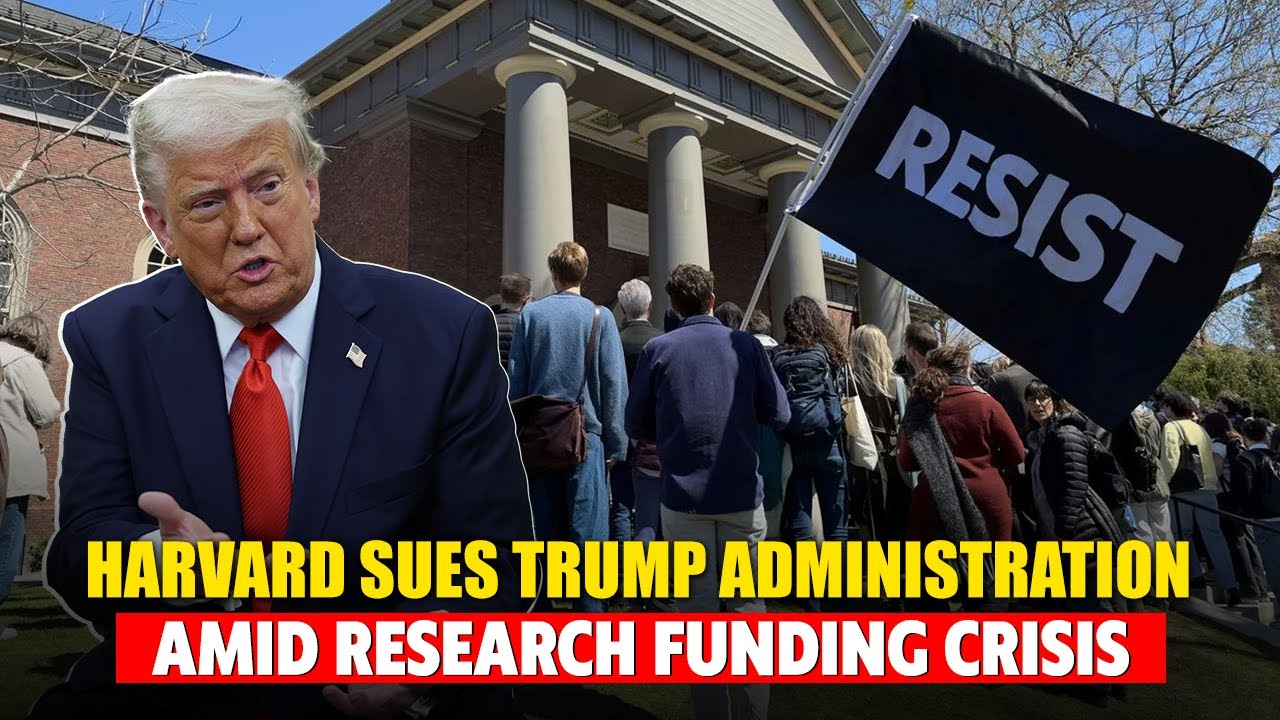The Harvard research funding crisis has sent shockwaves through the academic community, especially as it collides with recent funding cuts from the Trump administration. As the Wyss Institute faces halted projects, including crucial organ-on-a-chip technology endeavors worth millions, researchers are left scrambling to secure their work and positions. This crisis highlights the critical intersection of academic research and innovation, where the loss of funding threatens the very backbone of scientific collaboration at Harvard. The imminent financial uncertainty has raised concerns about how these decisions will impact ongoing and future Wyss Institute projects aimed at solving significant problems, from radiation exposure in astronauts to advancing medical therapeutics. In a landscape where federal support is waning, the stakes for Harvard’s researchers have never been higher, forcing them to adapt quickly or risk losing invaluable contributions to science.
The ongoing dilemma surrounding funding for research at Harvard University underscores a national trend of uncertainty regarding academic grants and federal support. Amid political changes, and with significant backing being slashed from federal bodies, institutions face mounting pressure to navigate these turbulent waters. The Wyss Institute, renowned for its innovative approaches to biological engineering and health technology, now finds itself at a crossroads, struggling to maintain its ambitious projects in light of fiscal restraints. As researchers rely heavily on public resources for groundbreaking work, the repercussions of these financial challenges extend beyond campus, threatening the nation’s position in global science and technological advancements. In this climate of potential disruption, the fate of numerous projects hinges not only on funding but also on the willingness of all parties to collaborate toward a sustainable resolution.
Understanding the Harvard Research Funding Crisis
The Harvard research funding crisis stemming from the Trump administration’s funding cuts poses a significant threat to groundbreaking projects within the university. The stop-work orders issued abruptly halted vital research at institutions like the Wyss Institute, directly affecting innovative efforts like organ-on-a-chip technology, which could revolutionize medical research and drug discovery. These funding cuts, amounting to approximately $2.2 billion, not only stifle Harvard’s academic research initiatives but also shake the very foundation of scientific innovation that the U.S. has built over decades. The disruption of funding has sparked chaos among researchers, forcing them to re-evaluate their projects and consider the future of their research careers during this tumultuous period.
Moreover, the implications of these funding barriers reach far beyond individual projects. They threaten the collaborative spirit essential for scientific advancement, primarily given Harvard’s position as a beacon for academic research and innovation. Physicists, biologists, and engineers at the university rely on continued government support to push the boundaries of knowledge and technological advancements. As many see the link between federal funding and the vitality of academic innovation, the crisis threatens to dismantle long-standing collaborative agreements that have historically fueled both economic growth and scientific progress in the United States.
In the wake of the funding crisis, Don Ingber, the founding director of the Wyss Institute, has voiced concerns regarding job security and researcher retention. The stop-work orders, which forced him to halt critical organ-on-a-chip research, risk prompting seasoned scientists and upcoming talent to seek opportunities abroad, where pathways for research and funding remain stable. As Harvard faces these significant uncertainties, the potential brain drain could set back progress in various scientific fields, ultimately undermining American leadership in global innovation.
The loss of funding not only affects ongoing projects but also hampers hiring practices and admissions at Ivy League institutions like Harvard. With fear and uncertainty dominating the atmosphere, it’s crucial for both university administrators and the federal government to come together to find solutions that restore funding and ensure the continuation of these vital research initiatives. The Harvard research funding crisis is a clarion call for an examination of the relationship between government policies and academic success, highlighting the need for intentional collaboration to cultivate a robust scientific landscape.
The Importance of Scientific Collaboration in Innovation
Scientific collaboration is at the heart of innovation, particularly in institutions like Harvard, where multidisciplinary teams work towards addressing complex global challenges. The recent funding cuts amid the Trump administration’s policy shifts could choke off critical projects at the Wyss Institute that rely heavily on interdepartmental cooperation. Projects utilizing organ-on-a-chip technology demonstrate how innovative approaches emerge from collective efforts among researchers, engineers, and medical professionals. By sharing diverse expertise and resources, academic institutions stimulate advancements that significantly impact areas such as healthcare and environmental science, fostering a culture of innovation.
Furthermore, as researchers and institutions around the globe encounter similar challenges, the interconnectedness of scientific endeavors becomes even more apparent. Collaboration leads to shared findings and amplified insights that can result in breakthroughs with far-reaching implications. Harvard has historically attracted global talent due to its robust partnerships in scientific research, creating an environment that thrives on diverse perspectives and innovative ideas. However, the funding crisis challenges this historical model, risking the U.S.’s competitive advantage in the global arena where collaboration is increasingly necessary for success.
The drive for scientific advancement thrives on collaboration, yet recent funding restrictions throw this dynamic into jeopardy. The Wyss Institute’s focus on innovative technologies such as organ-on-a-chip systems exemplifies how collaborative research builds upon shared knowledge and expertise. Ingber warns that without the federal support that once buoyed these collaborations, scientists may lose valuable momentum in projects critical to addressing pressing issues like healthcare and space exploration. In an era where scientific problems often cross disciplinary boundaries, collaboration is not just beneficial; it is essential for fostering a resilient innovation ecosystem.
Moreover, the fallout from the funding cuts could deter prospective researchers and scientists from pursuing careers in academia and innovation. This could lead to a significant reduction in the diversity of thought and background within research teams, undermining the creativity needed to solve contemporary problems. As Harvard and other universities fight to retain their positionality in the global scientific community, encouraging dialogue between government and academia is crucial to preserving a collaborative foundation that drives research and innovation forward.
The Role of Organ-on-a-Chip Technology in Modern Research
Organ-on-a-chip technology represents a remarkable intersection of engineering and biological sciences, providing researchers with powerful tools to mimic human organ functions in vitro. This innovative approach allows for real-time analysis of how human organs react to different drugs and diseases, making it an invaluable asset in the realm of medical research. The ongoing projects at the Wyss Institute, spearheaded by Don Ingber, focus on using this technology to assess the impacts of radiation and other stress factors on human biology, creating pathways for developing targeted therapies that could significantly improve patient outcomes and public health initiatives.
However, the current funding crisis jeopardizes the future of such pioneering research. By implementing stop-work orders, the Trump administration’s cuts hinder projects that could lead to breakthroughs in understanding critical medical phenomena. The disruption not only affects existing experiments but also creates an air of uncertainty for graduate students and postdoctoral researchers who rely on these projects to further their academic careers in biomedical fields. Without federal backing, the potential of organ-on-a-chip technology remains constrained, stymieing progress in understanding intricate human health and disease relationships.
Moreover, organ-on-a-chip technology stands to play an essential role in climate and space research, particularly concerning the effects of factors like microgravity on human health. Ingber’s work seeks to explore how these conditions might alter biological systems, laying the groundwork for advancing human space missions to Mars and beyond. Unfortunately, the halt on funding stifles such advancements, which require rigorous investigation and significant resources. As the U.S. sets ambitious goals for space exploration and tackling climate change, the interruption of organ-on-a-chip projects poses dire consequences for society’s readiness to innovate in the face of such challenges.
Ultimately, as serious as the implications of the funding crisis are, they underscore the pressing need for re-evaluating the relationship between governmental support and scientific enterprise. The pursuit of knowledge in areas such as organ-on-a-chip technology is not merely an academic endeavor; it’s essential for preparing for future societal challenges and safeguarding public health. By fostering a renewed partnership between the government and academia, researchers can continue to push the boundaries of innovation and propel America’s scientific leadership into the future.
Frequently Asked Questions
What is the Harvard research funding crisis related to the Trump administration funding cuts?
The Harvard research funding crisis refers to the significant pause in approximately $2.2 billion in federal research funding to the University, triggered by the Trump administration’s demands for governance changes. These funding cuts directly affected various research projects, including those at the Wyss Institute, impacting ongoing academic research and innovation.
How are Wyss Institute projects impacted by the Harvard research funding crisis?
Wyss Institute projects have faced immediate stop-work orders due to the funding crisis, which has put critical research on hold. Notably, organ-on-a-chip technology projects, which received over $19 million in contracts, are among those affected, creating uncertainty for researchers and jeopardizing advancements in scientific collaboration at Harvard.
Why is organ-on-a-chip technology important in the context of the Harvard research funding crisis?
Organ-on-a-chip technology is vital for studying the effects of radiation on human organs and has applications in cancer treatment. The Harvard research funding crisis threatens the progress of these projects, putting innovative research at risk during a critical time for medical and scientific breakthroughs.
What role does academic research and innovation play amid the Harvard research funding crisis?
Amidst the Harvard research funding crisis, academic research and innovation are crucial for driving technological development and supporting the economy. The ongoing disruption threatens to undermine the collaboration between academia and government that has historically fueled American innovation.
How is scientific collaboration at Harvard affected by the funding crisis?
The funding crisis has strained scientific collaboration at Harvard, as the halt on research funding has stymied projects, disrupted experiments, and caused uncertainty among researchers. This challenge threatens the institution’s ability to maintain its reputation as a hub for pioneering research and innovation.
What are the potential consequences of the Harvard research funding crisis on future research projects?
The Harvard research funding crisis may lead to lost progress on existing research projects, potential layoffs, and a chilling effect on attracting top talent. The disruption could hinder Harvard’s ability to initiate new innovative research, affecting its contributions to fields like biotechnology and space exploration.
How are Harvard researchers responding to the funding cuts from the Trump administration?
In response to the funding cuts from the Trump administration, Harvard researchers are assessing damages, exploring internal funding options, and working in collaboration with university administration to mitigate impacts on ongoing projects. Many are vocal about the importance of reinstating funding to sustain academic innovation.
What is the future of collaboration between government and academia after the Harvard research funding crisis?
The future of collaboration between government and academia may be uncertain post-crisis, as the funding cuts from the Trump administration suggest a shift in policy that could threaten the foundation of shared innovation efforts essential for scientific progress and technological advancements.
| Key Points | Details |
|---|---|
| Stop-Work Order Issued | A stop-work order was given to Harvard researchers impacting $19 million worth of two organ-on-a-chip projects. |
| Impact on Researchers and Projects | Many researchers, students, and postdoctoral fellows faced layoffs and project disruptions as a result of the halted funding. |
| Legal Actions | Harvard filed a lawsuit against the government’s demands, seeking to resume funding and labeling the actions as unconstitutional. |
| Importance of Research | Projects are crucial for studying human health under various conditions, impacting both terrestrial applications and space exploration. |
| Attracting Global Talent | The crisis has deterred talented scientists from accepting positions at Harvard due to the uncertainty surrounding research funding. |
Summary
The Harvard research funding crisis has created a significant disruption in scientific progress and talent retention at the institution. After the federal government froze approximately $2.2 billion in funding following Harvard’s refusal to comply with certain demands, researchers like Don Ingber have found themselves in precarious situations with projects on hold and staff facing potential layoffs. The situation raises critical questions about the role and stability of academic research funding in driving American innovation. As researchers navigate the challenges posed by this crisis, it is essential to recognize the implications of such funding disputes on future scientific advancements and the preparedness of the nation to remain a leader in research and technology.



